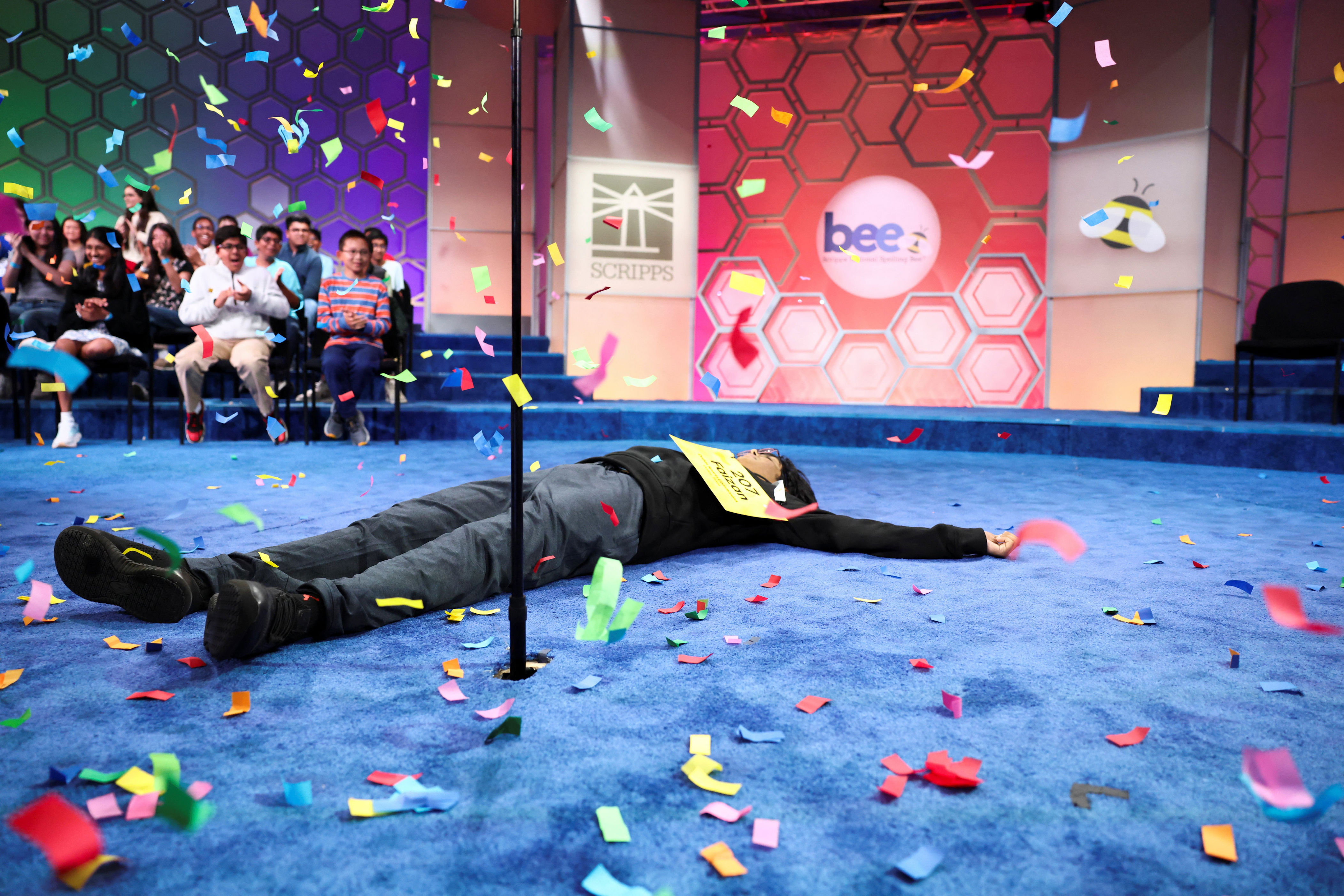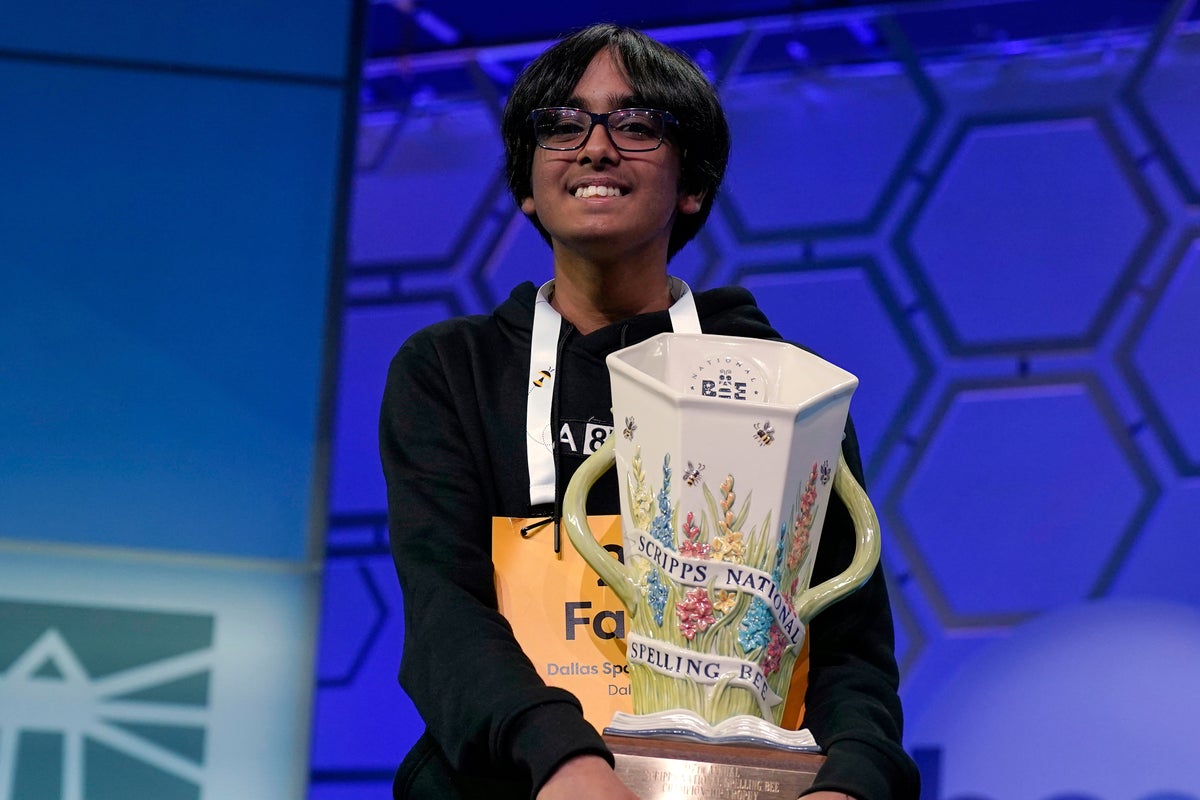Thirteen-year-old Faizan Zaki from
Plano
,
Texas
,, clinched victory in the finals of the
Scripps National Spelling Bee
On Thursday evening, the mind-bending term “éclaircissement” was introduced.
As he approached the last few letters, his voice started to crack.
of his victorious word, he collapsed onto the ground after getting it right
the Gaylord National Resort and Convention Center
er
in National Harbor,
Maryland
.
The term refers to the elucidation of an unclear matter.
Corrie Loeffler, who serves as the executive director of The Bee, described the concluding match as having “one of the most thrilling endings I’ve ever witnessed.”
The New York Times
noted.
Last year, Bruhat Soma, who was 12 years old and hails from St. Petersburg, Florida, won against Zaki during the second-ever spelling contest in the event’s history.
Zaki was the sole competitor from 2024 who also took part in this year’s finale.
The winner receives an award of $50,000, accompanied by monetary prizes for the subsequent five competitors as well.
In last year’s competition, a 90-second showdown was necessary for the ultimate win. The deciding round highlighted both velocity and precision equally.
As the third phase of the 2025 championship matches commenced,
Six spellers were still left standing. Thirteen-year-old Akshaj Somisetty, from
Harrisburg
,
Pennsylvania
was eliminated in the second round.
The final six contestants in the spelling bee came from
California
,
New Jersey
,
New York
,
Georgia
, Texas, and
North Carolina
.
In the third round, 13-year-old Esha Marupudi left.
Phoenix
,
Arizona
, following his typo of “aromorphosis,” and Oliver Halkett, aged 13, from
Los Angeles
who couldn’tspell “aurore.”
Harini Murali, hailing from Edison, New Jersey, lost consciousness in the seventh round after incorrectly omitting “tekke,” a term of Turkish origin referring to a dervish lodge. Likewise, Brian Liu, aged 13 and from Great Neck, New York, was also eliminated for accidentally including an extra “i” while attempting to spell “kyah.”
Aishwarya Kallakuri, 14, from
Charlotte
, North Carolina, left after failing to get “Keighley” correct.
A lot of the terminology was so difficult that the captions during the live stream of the event were incorrect.
In the tenth round, Sarvadnya Kadam, who is 14 years old and hails from Visalia, California, incorrectly spelled “Uaupés,” which is a river flowing through Brazil.
Colombia
and
Brazil
.
The youngest competitor, an 11-year-old named Sarv Dharavane, was eliminated after making a mistake with “eserine” during the ninth round.
In the eighth round, Zaki had a chance to triumph after Kadam and Dharavane made errors. Nevertheless, he began spelling the word “commelina” incorrectly as “k-a-m.”
Several consecutive rounds passed with flawless performances from the spellers throughout the night. However, the seventh round brought about some changes as multiple participants departed from the contest. This narrowed down the competitors to just Zaki, Kadam, and Dharavane, who continued their intense battle until the very last letter.

The week started off with 243 participants hailing from all 50 states along with
Puerto Rico
, the U.S. Virgin Islands, and the
Northern Mariana Islands
. Spellers from the
Bahamas
,
Canada
,
Germany
,
Ghana
,
Kuwait
, and
Nigeria
also took part.
Up to 178 participants competed for the first time, and approximately 30 percent of the competitors were 14 years old, with the youngest contestant being eight.
Participants were given 90 seconds to accurately spell a word once it was announced.
Participants might request a definition, identify the word’s grammatical role, see an example sentence, learn about its linguistic roots, explore synonyms, or just have the pronunciation repeated. All information comes from Merriam-Webster Unabridged as the authoritative reference for the Spelling Bee.
The competition started 100 years ago. However, it was cancelled four times, specifically from 1943 to 1945, due to World War II.
Second World War
, and in 2020 because of the
Covid-19
pandemic.
Due to an eight-way tie in 2019, a total of 109 champions have been named throughout the years, comprising 56 boys and 53 girls.
Self-reliant readers are globally aware individuals who think freely. Rather than being categorized by conventional metrics or descriptions, these people are characterized by their perspectives. Amidst our ever-diversifying society, groups cherish accurate data and straightforward viewpoints shared directly through an impartial news source they find credible. With knowledge and motivation at hand, independent thinkers feel enabled and prepared to advocate for what they hold dear.













